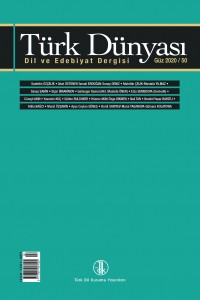Abstract
These letters that were written by Galiesgar Kamal from Istanbul to
Kazan during the Balkan Wars, the leading writer of the Tatar literature
and theatre in the 20th century, were published in Yoldiz newspaper. E.
Maksudi was the publisher of the Yoldiz newspaper published in Kazan
during the years 1906-1918 and G. Kamal was the editor in chief. In
the newspaper, articles of famous Tatar writers such as Abdullah Tukay,
Mecit Gafuri and Camal Velidi were published.
Galiesgar Kamal, one of the founders of modern Tatar literature, was
born on January 6, 1879 in Kazan. He studied at the famous Muhammadiye
Madrasah in Kazan between 1893 and 1900, after studying for several
years in the Osmaniye and Halidiye madrasahs, but he also attended to
the Russian school.
When G. Kamal finished the madrasah education, he established the
book company named Megarif Kütüphanesi in 1901 for spreading the
culture to the public and managed this company until The Constitutionalism
in 1905. This Constitutionalism in Russia paves the way for the expansion
of G. Kamal’s cultural activity and literary creativity. The next journalist
activity of the author is mainly around Yoldiz newspaper. Without short
leavings, he worked there until the October Revolution of 1917. Besides,
together with Abdullah Tukay, he published the humour magazine named
Yeşin that advocates innovative ideas in 1908-1909.
Because G. Kamal stayed in Istanbul for a few months between the
ends of 1912 and at the beginning of 1913, his letters contain intriguing
observations about Turkey on that period. G. Kamal was founder of the
Tatar theatre and close friend of A. Tukay and his letters show the place of
Turkey in G. Kamal’s thoughts and feelings. Thus, G. Kamal who made
translations from Molière and Gogol, translated and published the works
of Namık Kemal’s work titled as Zavalli Cocuk and Abdülhak Hamid’s
Duhter-i Hindu. The author’s Istanbul Letters reflect both the daily life of
the period and the areas behind the front during the war years.
G. Kamal reports closely the developments in the city: “The sending
of troops to Çatalca has been stopped. The trains going there are only busy
carrying supplies and weapons. Almost all of the soldiers that come there
are sent to Gallipoli. They do not bring non-military people to Gallipoli.
Almost every day, pilgrims come to Istanbul. Hotels and households are
all full of pilgrims. Ferryboats to Odessa pick pilgrims.”
Abstract
XX. yüzyıl Tatar edebiyatının ve tiyatrosunun önde gelen yazarı
Galiesgar Kamal’in Balkan Savaşı günlerinde İstanbul’dan, Kazan’a
yazdığı bu mektuplar, Yoldız gazetesinde yayımlanmıştır. 1906-1918
yılları boyunca Kazan’da çıkan Yoldız gazetesinin yayımcısı E. Maksudi,
Yazı İşleri Müdürü G. Kamal’dır. Gazetede Abdullah Tukay, Mecit Gafuri
ve Camal Velidi gibi ünlü Tatar yazarlarının makaleleri basılır.
Çağdaş Tatar edebiyatının kurucularından Galiesgar Kamal, 6 Ocak
1879 tarihinde Kazan’da doğmuştur. Birkaç yıl okuduğu Osmaniye ve
Halidiye medreselerinden sonra 1893-1900 yılları arasında Kazan’daki
ünlü Muhammediye medresesinde eğitim alır, ancak aynı zamanda Rus
okuluna da devam eder.
G. Kamal, medreseyi bitirince halka kültür yaymak amacıyla
1901 yılında Megarif Kütüphanesi adlı kitap şirketini kurar ve 1905
Meşrutiyeti’ne kadar bu şirketi yönetir. Rusya’daki 1905 Meşrutiyeti
G. Kamal’ın kültür alanındaki faaliyetinin ve edebî yaratıcılığının
genişlemesi yolunu açar. Yazarın bundan sonraki gazetecilik faaliyeti
başlıca Yoldız gazetesi çevresindedir. Kısa ayrılıkları saymazsak, 1917
Ekim Devrimi’ne kadar burada çalışır. Bunun yanı sıra 1908-1909
yıllarında Abdullah Tukay ile birlikte, yenilikçi görüşleri savunan Yeşin
(Şimşek) adlı mizah dergisini çıkarmıştır.
1912 sonu ile 1913 başlarında birkaç ay İstanbul’da kalan G.
Kamal’ın Türkiye’yi ne kadar yakından izlediğini yansıtan bu mektupları,
dönemin tarihi bakımından ilgi çekici gözlemler içermektedir. Mektuplar,
Tatar tiyatrosunun kurucusu, A. Tukay’ın yakın arkadaşı G. Kamal’ın
duygu ve düşünce yapısında Türkiye’nin nasıl bir yer tuttuğunu da
göstermektedir. Nitekim Molière ve Gogol’dan çeviriler yapan G. Kamal,
Namık Kemal’in Zavallı Çocuk ve Abdülhak Hamid’in Duhter-i Hindu
başlıklı eserlerini de çevirip yayımlamıştır. Yazarın İstanbul Mektupları
ise, hem devrin günlük yaşantısını hem savaş yıllarının cephe gerisini
yansıtmaktadır.
G. Kamal, şehirdeki gelişmeleri yakından izleyerek haberler
vermektedir: “Çatalca’ya asker gönderilmesi durduruldu. Oraya giden
trenler sadece erzak ve silah taşımakla meşguldürler. Bugün gelen
askerlerin neredeyse tamamı Gelibolu’ya gönderiliyor. Gelibolu’ya askerî
olmayan kişiyi sokmuyorlar. Yolcular ancak Çanakkale’ye gidebiliyorlar.
Hemen her gün İstanbul’a hacılar geliyor. Oteller ve hanelerin hepsi
hacılarla dolu. Odessa’ya giden vapurlar hacıları seçe seçe alıyorlar.
Hacıların neredeyse tamamı Türkistan, Kaşgar, İran ve diğer yerlerden
gelen kişilerden ibaret.”
Details
| Primary Language | Turkish |
|---|---|
| Subjects | Turkish Folklore, Creative Arts and Writing |
| Journal Section | Articles |
| Translators |
Mustafa Öner This is me |
| Publication Date | October 19, 2020 |
| Published in Issue | Year 2020 Issue: 50 |


